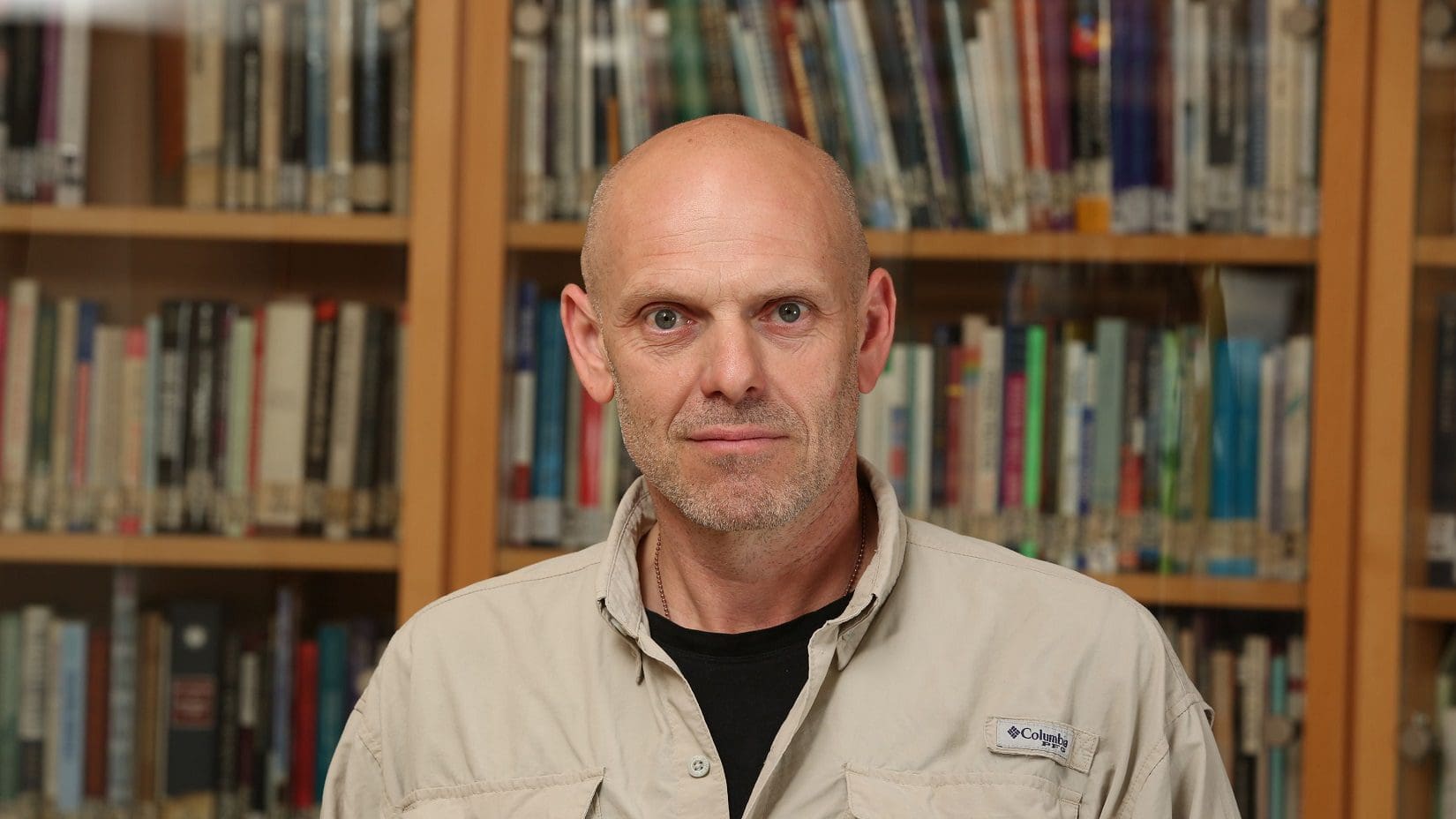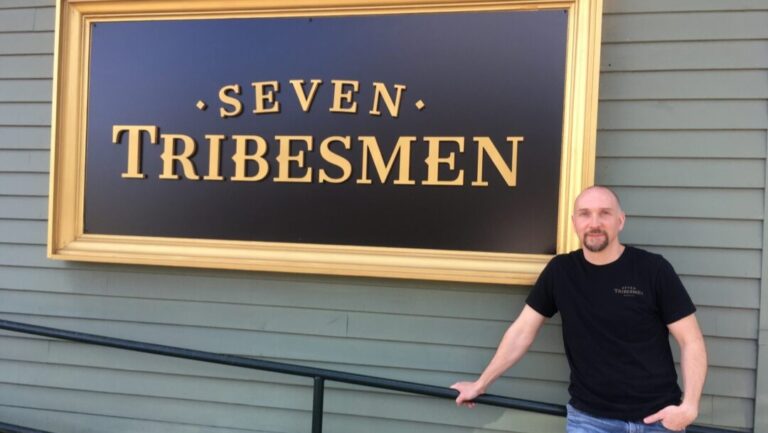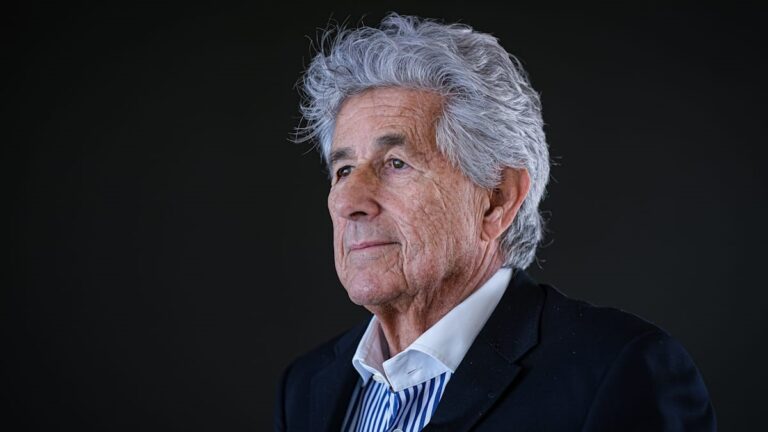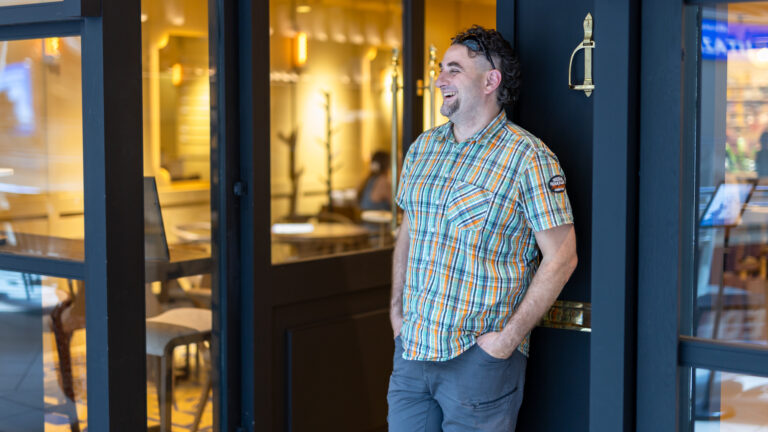Robert C. Castel is a former research fellow at the Israel Democracy Institute with research interests in asymmetric warfare, geopolitics, and military innovation. Between 1990 and 2009, he worked in various positions for Israel’s Security Forces. Since 2009, Castel has been a high-ranking civilian security official. He is also a reserve crisis negotiator for Israel’s National Counter-Terrorist Unit.
In 2012, he received his doctorate at the University of Haifa and conducted postdoctoral research in a joint project of the Israel Democracy Institute and the RAND Corporation. He authored the award-winning study The Cyberterrorist’s Manual for the Internet (1996, IICC). His first book, When Innovation Failed was published in 2017. He is one of the most well-known experts on the Russian-Ukrainian war in Hungary. His Hungarian-language book titled Függőleges Koporsó (‘Vertical Coffin’) was published in 2022.
How and why did you move to Israel from Transylvania in 1987?
I was born in 1970 in Transylvania, Romania. By the end of the ’80s, life became unbearable in Ceaușescu’s Romania. Therefore, my parents decided to join our larger family in Israel. Getting permission to leave was a difficult and tedious process, but in the end, we found our way through a hostile and Byzantine bureaucracy.
Military service is not a common experience for us living in Western countries. In Israel, after you turn 18, serving in the IDF is compulsory. Although with the war in Ukraine, the reality of warfare came a bit closer to European people, for Israelis, it’s a reality they have had to live with ever since their country was established. How did serving in the Israeli army change you and perhaps your perspective on the value of life?
I can talk only from my highly subjective personal experience. These formative years were much more important for me than anything that I did either in high school or university. I’ve served for six years in the IDF in various command positions, and it was an unparalleled, great school of life. It taught me that my limitations are way beyond what I have ever imagined. It also taught me how to accomplish my missions, how to command under fire, how to take care of my soldiers, how to bear responsibility, how to accept failure, how to fall down, how to get up again and work for a long time in order to achieve distant goals. These are the main benefits I’ve got from my army service. I think it’s very important for every youngster, boys as well as girls, to have this kind of experience.
There are great differences between how the Israeli army fights in the Israeli-Palestinian conflict and how the Palestinian side fights. Although those serving in the Israeli army have to obey serious ethical rules, the IDF is often portrayed as an unethical army. Could you tell me some of these main differences?
I think that the main difference is that in Israel, we have one loudspeaker, if I may use that metaphor, meaning one decision-maker, and 1 million rifles. The other side has 1 million loudspeakers and 1 million rifles. That’s the main difference. They have no competent command or authority with a monopoly over the use of force. It’s a huge tragedy because their leadership can’t formulate a policy and expect that this policy will be executed in a disciplined and orderly way. This is one of the main differences, because when everybody can make decisions about war and peace, what you get is unmitigated chaos.
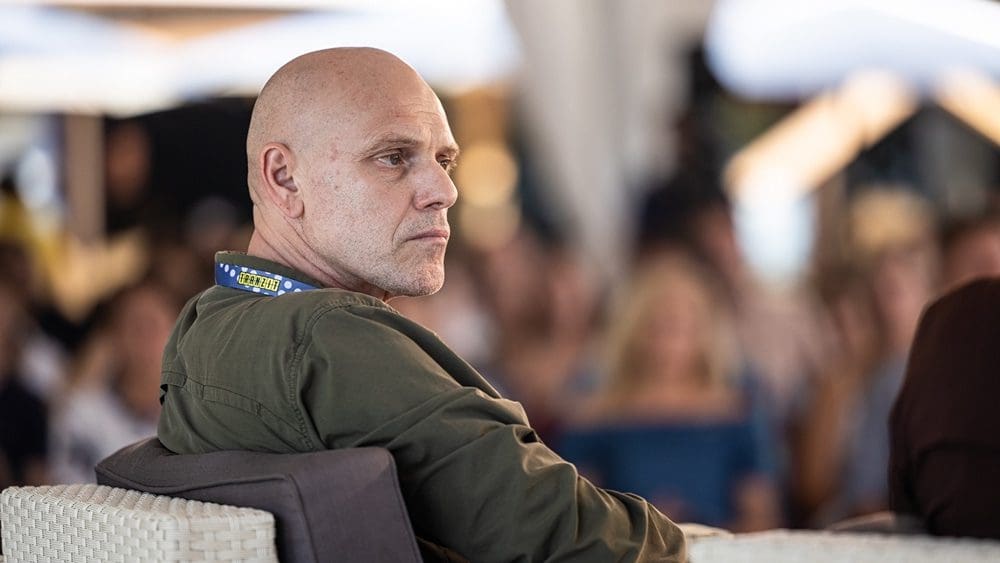
The other important difference is that the Israeli army is a Western army, and we have a strict ethical code and the concept of Purity of Arms. It is very strictly enforced in the IDF from its early years to this day. In every course that the IDF soldier takes in the army, there is a special educational programme whose purpose is to inculcate the supreme value of the Purity of Arms. This is what every democratic society expects from its armed forces. These are the two main differences between us and our Palestinian neighbours. Another one is that our primary identity is that of a nation. The nation is a quintessentially Western idea. The other side’s identity is a much more complex issue. First and foremost, there is a clan or tribal identity, then a religious one, last there is some kind of proto-national concept. Fuzzy identities and unclear loyalties often lead to confused and unpredictable actions.
It seems like another terror wave has started in Israel. One day before the International Holocaust Remembrance Day on 26 January, sirens sounded throughout the southern cities near the Gaza Strip as terrorists fired at least three rockets together from Gaza to Israel. On Holocaust Remembrance Day, a horrible terror attack happened in Jerusalem, followed by another one the next day, and yet another at the beginning of February when two children were killed. Ever since many rockets have been fired at Israeli villages near the Gaza Strip. Many people predict that the conflict might escalate into a Third Intifada. What is your take on that?
That’s a good question. We can see there are several long-term trends that we have to take into consideration. Israel cooperated in the establishment of the Palestinian Authority in order to start the long process of dividing ourselves from the Palestinians and to enable the Palestinian people to have their own state, their own political entity and their own way to political self-determination. Now, the problem is that this political elite imported from the Tunisian exile, the cadre of the Palestinian Authority, has failed to conquer the hearts and minds of the Palestinian people. They lack any legitimacy in the eyes of the average people on the Palestinian streets. Mahmoud Abbas, the President of the Palestinian Authority, was elected in 2005, and since then, he has had a never-ending ‘four-year’ term. So, there is no popular mandate and no moral authority for the current Palestinian administration to run this quasi-state called the Palestinian Autonomy.
Now, armed opposition Hamas, Islamic Jihad, and ISIS jump at every opportunity to nibble away the remaining legitimacy of the Palestinian Authority. They are hard at work establishing their authority and sovereignty over the Palestinian territories. For instance, in the two northern cities, Jenin and Nablus, the Palestinian Authority has lost any semblance of control, and armed groups took control over these cities. The American general in charge of coordinating between the American administration and the Palestinian Authority, Lieutenant General (LTG) Michael R. Fenzel tried to advance a plan of establishing a Palestinian special operations force trained by the United States to reconquer these cities for the Palestinian Authority, but Mahmoud Abbas’s administration wanted nothing to do with it. Instead, they have tried to buy off the leaders of these terrorist groups by offering them amnesty, high-paying jobs and even expensive cars to give up their fight, but it wasn’t successful. When Mahmoud Abbas proclaimed that he would end the security coordination with Israel, he sent a very strong signal to the street that every act of violence will be tolerated. We’re moving toward a boiling point during our Passover holidays, which coincides with Ramadan, and it will be a time of very high tension. Ramadan in Islamic countries was always a period of increased tension between the government and the governed. This is why the Ottoman Empire used to have a ‘Ramadan gun’ that fired a shot when the fast had ended, and people could have a feast of Iftar, the first meal after the fast of Ramadan. They’ve used the gun instead of the more usual call by the muezzin in order to remind the population that ‘you can be can be happy and enjoy the Ramadan’ but be aware because we have guns here. This was an old Ottoman custom, and it is an eloquent symbol of the tensions and dangers of this month of sanctity and martyrdom.
Still, when you visit Israel, you don’t meet with people who are afraid to go on the street but with people who face the constant threat of terrorist attacks with resilience and unbroken optimism. How can the Israeli people maintain their positive attitude?
The circumstances taught us how to cope with these situations, we feel that we have agency and we can influence these events.
A large part of the Israeli population is armed, we carry weapons every day, and we don’t feel that we cannot control the events or that we are helpless if something happens. We have a saying: ‘You are always your own first responder’. It gives you a sense of agency that you are a master of your own destiny and not a helpless victim.
One of the most common complaints against Israel is that the settlements established in the Palestinian Territories are the ‘obstacles to peace’. These complaints usually aren’t mentioning the Palestinian Authority and terror organisations like Hamas’s main responsibility in perpetuating this conflict. What is the real obstacle to peace in your opinion, and what would need to change to end the conflict?
There are two ethnic groups, political entities, between the Jordan River and the Mediterranean Sea. One is Jewish, and the other is Palestinian Arab. By entering the Oslo process, we have proclaimed that we do recognise the other side’s right to self-determination. We do recognise their right to have a political entity of their own between the River and the Sea. The exact borders and all the questions regarding Jerusalem, water, security and refugees are only secondary, technical questions.
The main obstacle to peace that we have never heard from the other side is that they also recognise the right of the Jews to a Jewish National State between the River and the Sea. Not some kind of multicultural entity, but a Jewish nation-state, a home for the Jewish nationhood. We have never heard from the other side that they recognise the Jews’ right to political self-determination, just like the one enjoyed by the Hungarians, the French, or any other nation. What we are asking for is to have our fundamental right to national self-determination recognised. That’s all. When this problem is solved, all the other issues regarding Jerusalem, the refugees, the water issues, and the security issues will shrink into straightforward technical questions that can be easily solved. There is no point in endlessly kicking around these technical questions until we deal with the main stumbling block of having our national rights recognised. That’s the essence of the Israeli-Palestinian tragedy in a nutshell.
At the Danube Institute, we launched a research project titled ‘Attacks on Christian Communities and Institutions’ in which we’re planning to do fieldwork in six countries from the Middle East to Africa and Europe. One of our fieldwork trips is going to be in Jerusalem, Jordan, and the Palestinian territories. How do Christians live in Israel compared to the West Bank, and why do many Christians who live there blame only Israel and not the Palestinian Authority and terrorist organizations for their sufferings?
I think there is an empirical answer and a political answer to this question. The empirical answer is very simple. Just look at the size of the Christian populations everywhere in the Middle East and Israel. You can see that there is only one place in the Middle East where the Christian population has grown in numbers—this is Israel. In all other places, the Christian population shrunk or outright collapsed. During the last decades, we have witnessed the tragic collapse of ancient Christian communities. We have seen it in Iraq, Syria, Lebanon, and the Palestinian Territories as well. For instance, in Gaza, there once was a sizable Christian population; now, perhaps a few hundred Christians live there under the constant threat of religious persecution. You can see such Christian cities as Bethlehem turning into Muslim cities very fast.
As a result of this overt and covert pressure, many Christians emigrated from the Middle East, and the only place where they can live in peace and prosperity is in Israel. One fascinating trivia is that in key socio-economic parameters, such as the level of education and financial prosperity, Christian Arabs in Israel rank even higher than the Ashkenazi Jews. One may say that the Jews in Israel got ‘Jews’ of their own, and these are the Christian Arabs. This is the empirical answer.
The political answer is straightforward: you can’t live in the Palestinian Territories and speak out against the dominant narrative enforced by the endless formal and informal means. For instance, you will never find a foreign journalist saying something negative about the Palestinian Authority and continuing to work there unmolested. It is the same for the Christians living there. The Christians living under the thumb of Palestinian Authorities are hostages to the authorities and to the Islamic extremists. Their blaming of Israel, for all of their woes, is a textbook case of Stockholm syndrome. The only one they can blame without suffering some harm is Israel. It reminds me of the old joke about a Soviet citizen and an American citizen talking about life in their respective countries. The American tells the Soviet, ‘Look, in the United States, everybody can criticise our president’, and the Soviet tells him, ‘It is the same for us. In the Soviet Union, everybody can freely criticise your president, too.’
In 2022, the UN passed 15 resolutions against Israel and only 13 against the rest of the world. Unlike the majority of the member states of the UN, Hungary voted ‘no’ to most of the resolutions that condemned the Jewish State and promised it will stand with Israel these years as well. How do you evaluate the Hungarian government’s efforts to support the State of Israel?
We very much appreciate the help and support from Hungary to Israel. We are very grateful for this help from the Hungarian nation, the Hungarian people and the Hungarian government. I think that the Hungarians living with the trauma of the Trianon Treaties understand perfectly well that might doesn’t make right. They also understand that the fact that a resolution is accepted by a majority vote, does not make it just and virtuous. Perhaps the Hungarians are the only nation in Europe able to feel and understand what we in Israel go through when we are exposed to unceasing criticism while upholding Middle East’s only liberal democracy.
You visited Hungary many times. At the Danube Institute in 2021, we did a research project titled Anti-Semitism in Hungary: Appearance and Reality in which we did in-depth interviews with the Hungarian Jewish community. While the mainstream media portrays Hungary as one of the most anti-Semitic countries in Europe, many Jewish people feel safe in Hungary and haven’t experienced serious anti-Semitic incidents. What is your experience in Hungary as an Israeli Jew?
When I go to Hungary, I usually wear my heart on my sleeve, so everybody knows who I am, that I am an Israeli Jew, and I say this to everybody. I never felt or experienced any animosity towards me in the physical sphere in Hungary. In the cyberspace, however, I can tell you that once I got a ‘nice’ compliment, saying, ‘If every Jew holds carries the same beliefs about the European Union as you, it’s a great pity that only 6 million were murdered.’ So, this was the most atrocious thing anyone had said to me. I consider it symptomatic, and I tell you why. I’ve been following the events in Hungary for more than 40 years, and I can discern two very clear trends. On the conservative right, Anti-Semitism has become something that perhaps some people still possess, still feel, but are too ashamed to proclaim it. I have no illusions. There are some people still harbouring Anti-Semitic prejudices, but I also think that it has become very unacceptable for the conservative right to express these views.
On the other hand, there is a new, progressive type of Anti-Semitism, that is sometimes cloaked in the form of Anti-Zionism or a certain love for the Palestinians. The latter is, of course, a cheesy fake, because when Palestinians are massacred in Syria for instance, the same people don’t even give a hoot about their suffering. It only becomes an issue when the Jews are in the picture. As we say here, Jews are news. On the far left, we can see that this new type of Anti-Semitism has become more and more acceptable, a kind of obligatory rite of entry into hard-core Progressive circles. You can’t be a bone fide hard-core progressive without harbouring some type of Anti-Semitism. I think that Anti-Semitism is the proverbial canary in the coal mine because you will seldom meet Anti-Semitic opinions on the moderate left or on the moderate right. It is the hallmark of the extreme right and extreme left. Also, we can see people gravitating from the extreme right to the extreme left because there they get the platform and the legitimacy to express these prejudices. In a strange way, it may indicate the true state of our contemporary culture wars. Anti-Semitism was always the affliction of the defeated parties in the wars of the last century.
Many people talk about a post-Zionist era. What is the message of Zionism in the 21st century and what is the role of the next generation in it?
The Israeli intelligentsia apeing the developments in the USA had its own flirtation with post-Zionism during the late 90s. Then we got the Second Intifada, which is a euphemism for a terror war that killed more than 1,000 Israelis. Post-Zionism died an instant and inglorious death, because that terror war it made very clear to the general population that the War of Independence has not ended, and we are still fighting for our bare existence.
When people fight for their country, their nation, their religion, for their sheer survival, there is no place for these sophisticated forms of self-loathing and moral disarmament.
Today, in 2023, we are still living the realities of 1948 and the War for Independence still rages on. Therefore, patriotism will never go out of fashion in Israel.

